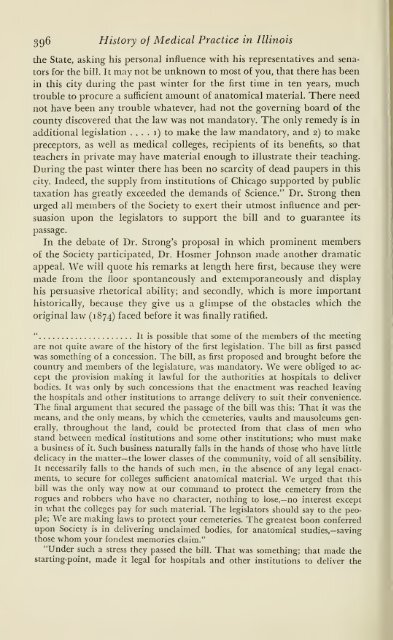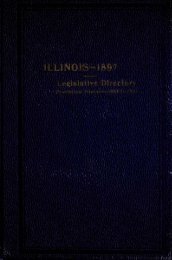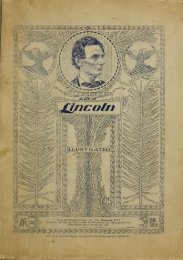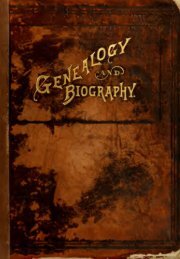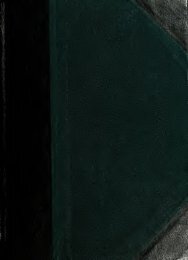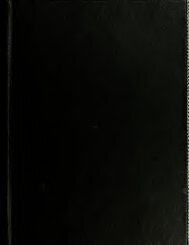- Page 1 and 2:
aIiiHmlfHillI-.'
- Page 3 and 4:
nT-K-avtK- Vx: ^VuONlVs.
- Page 5 and 6:
HISTORY OFMEDICAL PRACTICEIN ILLINO
- Page 7 and 8:
i3 Zvibxxtt to Br. 30. 3L ©abteTHI
- Page 9 and 10:
PREFACEVARIOUS members of the Illin
- Page 11 and 12:
Prefaceixall of its local health de
- Page 13 and 14:
PrefacexiDr. E. A. Piszczek, Chicag
- Page 15 and 16:
THEEDITOR'S FOREWORDperiod 1850 to
- Page 17:
Editor's Forewordxvand 650 he comme
- Page 20 and 21:
xviiiXVIII.XIX.Medical Bacteriology
- Page 23 and 24:
CHAPTER IINTRODUCTIONBy DAVID J.DAV
- Page 25 and 26:
Introduction 5Smillie 3 wrote on ep
- Page 27 and 28:
CHAPTER IIMEDICAL GEOGRAPHY OF ILLI
- Page 29 and 30:
Medical Geography of Illinois 9geol
- Page 32:
12 History of Medical Practice in I
- Page 35 and 36:
Medical Geography of Illinois 15had
- Page 37 and 38:
Medical Geography of Illinois 17of
- Page 39:
Fig. i. Places and regions in Illin
- Page 42 and 43:
20 History of Medical Practice in I
- Page 45 and 46:
Medical Geography of Illinois 21ref
- Page 47 and 48:
Medical Geography of Illinois 23Cha
- Page 49:
i„r»-l ll'urlnllli• A i!.n»Ut
- Page 52 and 53:
CHAPTER IIITHE HARDY PIONEER:HOW HE
- Page 54 and 55:
28 History of Medical Practice in I
- Page 56 and 57:
30 History of Medical Practice in I
- Page 58 and 59:
32 History of Medical Practice in I
- Page 60 and 61:
34 History of Medical Practice in I
- Page 62 and 63:
CHAPTER IVORGANIZATION OF THE ILLIN
- Page 64 and 65:
38 History of Medical Practice in I
- Page 66 and 67:
40 History of Medical Practice in I
- Page 68 and 69:
42 History of Medical Practice in I
- Page 70 and 71:
44 History of Medical Practice in I
- Page 72 and 73:
46 History of Medical Practice in I
- Page 74 and 75:
48 History of Medical Practice in I
- Page 76 and 77:
50 History of Medical Practice in I
- Page 78 and 79:
52 History of Medical Practice in I
- Page 80 and 81:
54 History of Medical Practice in I
- Page 82 and 83:
56 History of Medical Practice in I
- Page 84 and 85:
58 History of Medical Practice in I
- Page 86 and 87:
60 History of Medical Practice in I
- Page 88 and 89:
62 History of Medical Practice in I
- Page 90 and 91:
64 History of Medical Practice in I
- Page 92 and 93:
66 History of Medical Practice in I
- Page 94 and 95:
68 History of Medical Practice in I
- Page 96 and 97:
70 History of Medical Practice in I
- Page 98 and 99:
72 History of Medical Practice in I
- Page 100 and 101:
74 History of Medical Practice in I
- Page 102 and 103:
76 History of Medical Practice in I
- Page 104 and 105:
78 History of Medical Practice in I
- Page 106 and 107:
80 History of Medical Practice in I
- Page 108 and 109:
82 History of Medical Practice in I
- Page 110 and 111:
84 History of Medical Practice in I
- Page 112 and 113:
86 History of Medical Practice in I
- Page 114 and 115:
88 History of Medical Practice in I
- Page 116 and 117:
goHistory of Medical Practice in Il
- Page 118 and 119:
92 History of Medical Practice in I
- Page 120 and 121:
94 History of Medical Practice in I
- Page 122 and 123:
96 History of Medical Practice in I
- Page 124 and 125:
98 History of Medical Practice in I
- Page 126 and 127:
iooHistory of Medical Practice in I
- Page 128 and 129:
102 History of Medical Practice in
- Page 130 and 131:
104 History of Medical Practice in
- Page 132 and 133:
106 History of Medical Practice in
- Page 134 and 135:
CHAPTER VIIINTERNAL MEDICINEBy GEOR
- Page 136 and 137:
i io History of Medical Practice in
- Page 138 and 139:
1 12 History of Medical Practice in
- Page 140 and 141:
114 History of Jiledical Practice i
- Page 142 and 143:
1 16 History of Medical Practice in
- Page 144 and 145:
1 18 History of Medical Practice in
- Page 146 and 147:
1 20 History of Medical Practice in
- Page 148 and 149:
122 History of Medical Practice in
- Page 150 and 151:
124 History of Medical Practice in
- Page 152 and 153:
126 History of Medical Practice in
- Page 154 and 155:
128 History of Medical Practice in
- Page 156 and 157:
13° History of Medical Practice in
- Page 158 and 159:
132 History of Medical Practice in
- Page 160 and 161:
134 History of Medical Practice in
- Page 162 and 163:
136 History of Medical Practice in
- Page 164 and 165:
Histo-rx of Medical Practice in Ill
- Page 166 and 167:
140 History of Medical Practice in
- Page 168 and 169:
142 History of Medical Practice in
- Page 170 and 171:
144 History of Medical Practice in
- Page 172 and 173:
146 History of Medical Practice in
- Page 174 and 175:
148 History of Medical Practice in
- Page 176 and 177:
150 History of Medical Practice in
- Page 178 and 179:
152 History of Medical Practice in
- Page 180 and 181:
154 History of Medical Practice in
- Page 182 and 183:
156 History of Medical Practice in
- Page 184 and 185:
158 History of Medical Practice in
- Page 186 and 187:
1 60 History of Medical Practice in
- Page 188 and 189:
162 History of Medical Practice in
- Page 190 and 191:
1 64 History of Medical Practice in
- Page 192 and 193:
166 History of Medical Practice in
- Page 194 and 195:
168 History of Medical Practice in
- Page 196 and 197:
170 History of Medical Practice in
- Page 198 and 199:
172 History of Medical Practice in
- Page 200 and 201:
174 History of Medical Practice in
- Page 202 and 203:
176 History of Medical Practice in
- Page 204 and 205:
178 History of Medical Practice in
- Page 206 and 207:
1 80 History of Medical Practice in
- Page 208 and 209:
1 82 History of Medical Practice in
- Page 210 and 211:
184 History of Medical Practice in
- Page 212 and 213:
1 86 History of Medical Practice in
- Page 214 and 215:
188 History of Medical Practice in
- Page 216 and 217:
190 History of Medical Practice in
- Page 218 and 219:
192 History of Medical Practice in
- Page 220 and 221:
1 94 History of Medical Practice in
- Page 222 and 223:
ig6History of Medical Practice in I
- Page 224 and 225:
ig8History of Medical Practice in I
- Page 226 and 227:
200 History of Medical Practice in
- Page 228 and 229:
202 History of Medical Practice in
- Page 230 and 231:
204 History of Medical Practice in
- Page 232 and 233:
206 History of Medical Practice in
- Page 234 and 235:
208 History of Medical Practice in
- Page 236 and 237:
210 History of Medical Practice in
- Page 238 and 239:
212 History of Medical Practice in
- Page 240 and 241:
214 History of Medical Practice in
- Page 242 and 243:
216 History of Medical Practice in
- Page 244 and 245:
218 History of Medical Practice in
- Page 246 and 247:
220 History of Medical Practice in
- Page 248 and 249:
222 History of Medical Practice in
- Page 250 and 251:
224 History of Medical Practice in
- Page 252 and 253:
226 History of Medical Practice in
- Page 254 and 255:
228 History of Medical Practice in
- Page 256 and 257:
230 History of Medical Practice in
- Page 258 and 259:
232 History of Medical Practice in
- Page 260 and 261:
234 History of Medical Practice in
- Page 262 and 263:
236 History of Medical Practice in
- Page 264 and 265:
238 History of Medical Practice in
- Page 266 and 267:
240 History of Medical Practice in
- Page 268 and 269:
242 History of Medical Practice in
- Page 270 and 271:
244 History of Medical Practice in
- Page 272 and 273:
246 History of Medical Practice in
- Page 274 and 275:
248 History of Medical Practice in
- Page 276 and 277:
250 History of Medical Practice in
- Page 278 and 279:
252 History of Medical Practice in
- Page 280 and 281:
254 History of Medical Practice in
- Page 282 and 283:
256 History of Medical Practice in
- Page 284 and 285:
2 5 8 History of Medical Practice i
- Page 286 and 287:
260 History of Medical Practice in
- Page 288 and 289:
262 History of Medical Practice in
- Page 290 and 291:
264 History of Medical Practice in
- Page 292 and 293:
266 History of Medical Practice in
- Page 294 and 295:
268 History of Medical Practice in
- Page 296 and 297:
270 History of Medical Practice in
- Page 298 and 299:
272 History of Medical Practice in
- Page 300 and 301:
274 History of Medical Practice in
- Page 302 and 303:
History of Medical Practice in Illi
- Page 304 and 305:
278 History of Medical Practice in
- Page 306 and 307:
CHAPTER XIIIOTOLARYNGOLOGYBy ALFRED
- Page 308 and 309:
282 History of Medical Practice in
- Page 310 and 311:
284 History of Medical Practice in
- Page 312 and 313:
286 History of Medical Practice in
- Page 314 and 315:
288 History of Medical Practice in
- Page 316 and 317:
2 go History of Medical Practice in
- Page 318 and 319:
292 History of Medical Practice in
- Page 320 and 321:
294 History of Medical Practice in
- Page 322 and 323:
296 History of Medical Practice in
- Page 324 and 325:
298 History of Medical Practice in
- Page 326 and 327:
gooHistory of Medical Practice in I
- Page 328 and 329:
302 History of Medical Practice in
- Page 330 and 331:
304 History of Medical Practice in
- Page 332 and 333:
CHAPTER XIVDERMATOLOGYBy B.BARKER B
- Page 334 and 335:
go8History of Medical Practice in I
- Page 336 and 337:
310 History of Medical Practice in
- Page 338 and 339:
3 i 2 History of Medical Practice i
- Page 340 and 341:
CHAPTER XVNEUROPSYCHIATRYBy OSCAR H
- Page 342 and 343:
3 16 History of Medical Practice in
- Page 344 and 345:
3 1 History of Medical Practice in
- Page 346 and 347:
320 History of Medical Practice in
- Page 348 and 349:
322 History of Medical Practice in
- Page 350 and 351:
324 History of Medical Practice in
- Page 352 and 353:
326 History of Medical Practice in
- Page 354 and 355:
328 History of Medical Practice in
- Page 356 and 357:
330 History of Medical Practice in
- Page 358 and 359:
332 History of Medical Practice in
- Page 360 and 361:
334 History of Medical Practice in
- Page 362 and 363:
336 History of Medical Practice in
- Page 364 and 365:
338 History of Medical Practice in
- Page 366 and 367:
34oHistory of Medical Practice in I
- Page 368 and 369:
342 History of Medical Practice in
- Page 370 and 371:
344 History of Medical Practice in
- Page 372 and 373: 346 History of Medical Practice in
- Page 374 and 375: 348 History of Medical Practice in
- Page 376 and 377: 350 History of Medical Practice in
- Page 378 and 379: 352 History of Medical Practice in
- Page 380 and 381: 354 History of Medical Practice in
- Page 382 and 383: 356 History of Medical Practice in
- Page 384 and 385: 358 History of Medical Practice in
- Page 386 and 387: 360 History of Medical Practice in
- Page 388 and 389: 362 History of Medical Practice in
- Page 390 and 391: 364 History of Medical Practice in
- Page 392 and 393: g66History of Medical Practice in I
- Page 394 and 395: 368 History of Medical Practice in
- Page 396 and 397: 37° History of Medical Practice in
- Page 398 and 399: 372 History of Medical Practice in
- Page 400 and 401: 374 History of Medical Practice in
- Page 402 and 403: 376 History of Medical Practice in
- Page 404 and 405: 378 History of Medical Practice in
- Page 406 and 407: 380 History of Medical Practice in
- Page 408 and 409: 382 History of Medical Practice in
- Page 410 and 411: 384 History of Medical Practice in
- Page 412 and 413: 386 History of Medical Practice in
- Page 414 and 415: g 88History of Medical Practice in
- Page 416 and 417: 3goHistory of Medical Practice in I
- Page 418 and 419: 392 History of Medical Practice in
- Page 420 and 421: 394 History of Medical Practice in
- Page 424 and 425: 398 History of Medical Practice in
- Page 426 and 427: 400 History of Medical Practice in
- Page 428 and 429: 402 History of Medical Practice in
- Page 430 and 431: 404 History of Medical Practice in
- Page 432 and 433: 406 History of Medical Practice in
- Page 434 and 435: 408 History of Medical Practice in
- Page 436 and 437: 41 o History of Medical Practice in
- Page 438 and 439: 412 History of Medical Practice in
- Page 440 and 441: a414 History of Medical Practice in
- Page 442 and 443: 641History of Medical Practice in I
- Page 444 and 445: 841History of Medical Practice in I
- Page 446 and 447: 420 History of Medical Practice in
- Page 448 and 449: 422 History of Medical Practice in
- Page 450 and 451: 424 History of Medical Practice in
- Page 452 and 453: 426 History of Medical Practice in
- Page 454 and 455: 428 History of Medical Practice in
- Page 456 and 457: 430 History of Medical Practice in
- Page 458 and 459: 432 History of Medical Practice in
- Page 460 and 461: 434 History of Medical Practice in
- Page 462 and 463: 436 History of Medical Practice in
- Page 464 and 465: 438 History of Medical Practice in
- Page 466 and 467: 440 History of Medical Practice in
- Page 468 and 469: 442 History of Medical Practice in
- Page 470 and 471: 444 History of Medical Practice in
- Page 472 and 473:
446 History of Medical Practice in
- Page 474 and 475:
448 History of Medical Practice in
- Page 476 and 477:
450 History of Medical Practice in
- Page 478 and 479:
452 History of Medical Practice in
- Page 480 and 481:
454 History of Medical Practice in
- Page 482 and 483:
456 History of Medical Practice in
- Page 484 and 485:
458 History of Medical Practice in
- Page 486 and 487:
460 History of Medical Practice in
- Page 488 and 489:
462 History of Medical Practice in
- Page 490 and 491:
464 History of Medical Practice in
- Page 492 and 493:
466 History of Medical Practice in
- Page 494 and 495:
468 History of Medical Practice in
- Page 496 and 497:
470 History of Medical Practice in
- Page 498 and 499:
472 History of Medical Practice in
- Page 500 and 501:
474 History of Medical Practice in
- Page 502 and 503:
476 History of Medical Practice in
- Page 504 and 505:
478 History of Medical Practice in
- Page 506 and 507:
CHAPTER XXIVMEDICAL JOURNALISM IN I
- Page 508 and 509:
482 History of Medical Practice in
- Page 510 and 511:
484 History of Medical Practice in
- Page 512 and 513:
486 History of Medical Practice in
- Page 514 and 515:
488 History of Medical Practice in
- Page 516 and 517:
490 History of Medical Practice in
- Page 518 and 519:
492 History of Medical Practice m I
- Page 520 and 521:
4g4History of Medical Practice in I
- Page 522 and 523:
496 History of Medical Practice in
- Page 524 and 525:
498 History of Medical Practice in
- Page 526 and 527:
gooHistory of Medical Practice in I
- Page 528 and 529:
APPENDIXMISCELLANEOUS NOTESAddition
- Page 530 and 531:
504 History of Medical Practice in
- Page 532 and 533:
506 History of Medical Practice in
- Page 534 and 535:
508 History of Medical Practice in
- Page 536 and 537:
5ioIndexAntifebrin, 138, 139Antipyr
- Page 538 and 539:
5 1 * Index159, 163, 190, 284; Amer
- Page 540 and 541:
5HCollege of Medicine, University o
- Page 542 and 543:
516 IndexEpidemics, 5, 507Epileptic
- Page 544 and 545:
15 i8 IndexHarris, Dr. J. O., 115Ha
- Page 546 and 547:
5 2 ° IndexJacobson, Dr. Daniel Si
- Page 548 and 549:
522Index456, 457; Privately Endowed
- Page 550 and 551:
524IndexParkes, Dr. Charles T., 181
- Page 552 and 553:
3526IndexReed, Dr. Carlos I., 403Re
- Page 554 and 555:
5 s8 IndexStrong, Dr. R. M., Histor
- Page 556:
530IndexWright, Mrs. Edward, 479Wri


